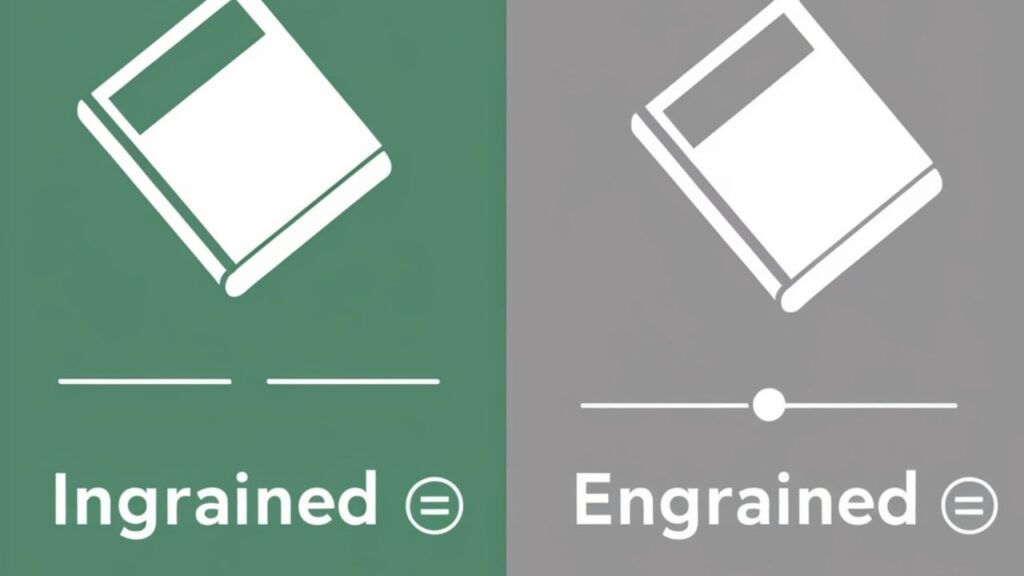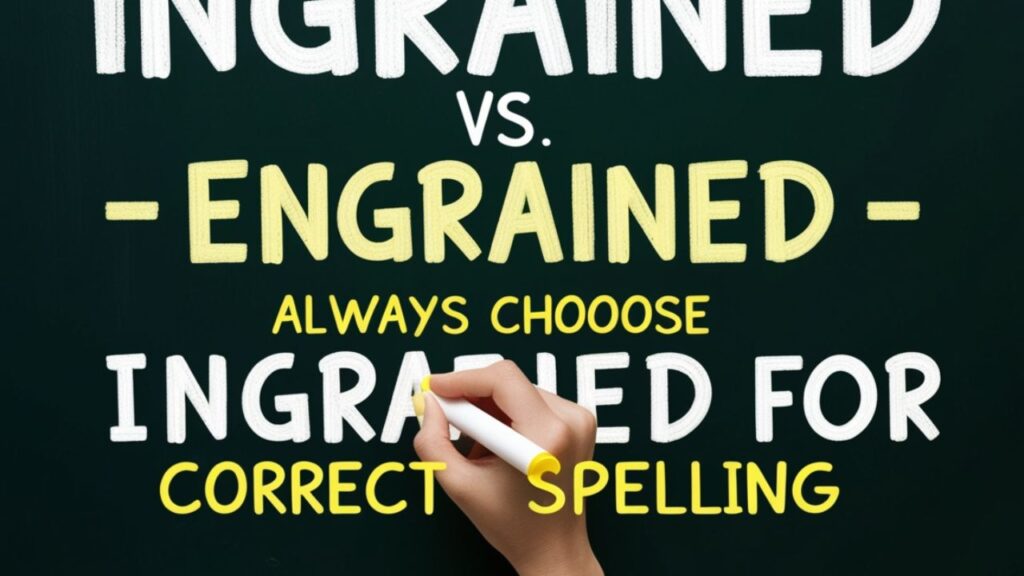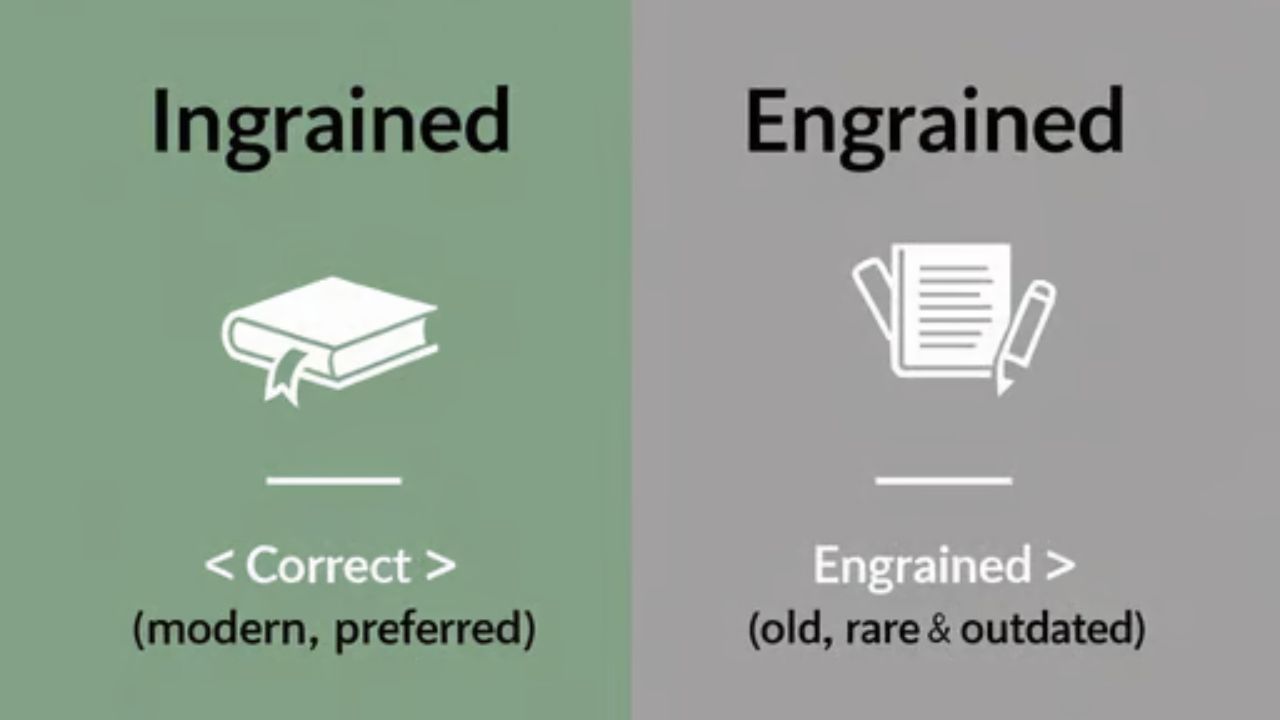The word ingrained means something fixed deeply inside a habit, thought, or action. People use it to show that something is strong and not easy to change. This spelling is correct in schools, books, and most formal writing.
The spelling engrained is also seen, but it is very old and not used often now. Some writers in history used it, and you may still find it in older English stories or poems. Modern teachers prefer the simpler form.
When you write for class or share your ideas, always choose ingrained. It helps you sound clear and correct. Using the other form may confuse readers. Choosing the right spelling makes your writing neat and professional.
Why People Get “Ingrained” and “Engrained” Mixed Up
Many learners mix ingrained and engrained because they look almost the same. Both sound alike when spoken, and that makes it harder to notice the spelling change. Older books often use the second form, which can confuse new readers.
Writers today choose ingrained because it is clear and accepted everywhere. Teachers, dictionaries, and style guides all list it as the right spelling. Using this form keeps writing simple, modern, and easy for everyone to understand.
What Does “Ingrained” Really Mean?
The word ingrained shows that something is fixed very deeply. It can be a habit, a thought, or a feeling that stays inside a person for a long time. It becomes part of daily life and feels natural.
People use ingrained to describe qualities that are strong and lasting. Kindness, respect, or even fears can stay in this way. When something is formed like this, it becomes hard to change because it feels steady and permanent.
See also : Invision or Envision: Which Spelling Is Correct?
Common Uses of “Ingrained”
The word ingrained often describes habits that people follow every day. Examples include brushing teeth in the morning, greeting politely, or keeping books safe. These actions stay strong inside a person and shape good routines without much thought.
Writers also use ingrained for values or feelings that guide behavior. Respect for elders, love for family, or honesty in work are strong examples. Such qualities become part of character and remain steady throughout life.
- Habits: Daily routines like brushing teeth or waking up early can be described as ingrained.
- Beliefs: Strong ideas such as honesty or fairness often stay ingrained in people’s minds.
- Feelings: Emotions like respect or kindness may become ingrained in character.
The Rare Cousin: Understanding “Engrained”
Engrained is the older sibling, less used today, but not always incorrect. It shares the same meaning as ingrained, yet it pops up less often, mostly in British English or older texts.
When Might You See “Engrained”?
- In older books or writings from the past centuries.
- In some British English texts or regional documents.
- In poems or stories that use old-fashioned style.
Origins and Etymology: Tracing Both Words Back
| Word | Origin | Meaning Root |
| Ingrained | From Latin in- (in) + granum (grain) | Originally meant ‘to fix firmly in the grain or texture’ |
| Engrained | Variant spelling influenced by “engrave” | Likely influenced by “engrave,” meaning to carve deeply |
The word ingrained comes from Latin roots. The part “in” means inside, and “granum” means grain. At first, it described color pressed deeply into cloth, showing how something could be fixed strongly within another thing.
The form engrained appeared later because of the word “engrave.” Writers linked the ideas of carving and fixing something deeply. Over time, people preferred the simpler spelling that matched its Latin base, so it became the common form used today.
The Verbs Behind the Adjectives: Ingrain vs. Engrain

- Ingrain means to fix an idea, habit, or value deeply.
- Teachers often ingrain good manners in students from an early age.
- Practice can ingrain skills like reading, writing, or drawing.
- Engrain carries the same meaning but is used far less.
- Modern English favors ingrain, while engrain feels old-fashioned.
Which Word Dominates Today? Usage Trends and Data
| Word | Frequency (Approximate) | Comments |
| Ingrained | 100% | Standard, common in modern English |
| Engrained | <1% | Rare, mostly historical or regional |
Today, ingrained is the clear choice in schools, books, and news writing. Modern dictionaries show it as the main spelling. Studies of language use also confirm that this form appears far more often in everyday reading and formal texts.
The spelling engrained is rare and seen mostly in older writings or special styles. It does not appear much in modern speech or learning materials. Because of this, teachers and editors guide learners to always prefer the more common spelling.
Real-World Examples: Using “Ingrained” Correctly in Sentences
- Respect for parents is ingrained in many cultures.
- His morning walk is an ingrained part of daily life.
- Fear of the dark became ingrained during childhood.
- Honesty is ingrained in her personality.
- The team’s hard work is ingrained in their success.
See also : Thus Far vs So Far: Key Differences Explained
Common Mistakes to Avoid
- Using engrained in modern school or formal writing.
- Mixing ingrained with the word engrave, which has a different meaning.
- Forgetting that ingrained shows something deep and lasting.
- Writing the verb form incorrectly in sentences.
- Choosing rare spellings that confuse the reader.
Style and Grammar Tips: When to Use “Ingrained” Over “Engrained”

- Using engrained in modern school or formal writing.
- Mixing ingrained with the word engrave, which has a different meaning.
- Forgetting that ingrained shows something deep and lasting.
- Writing the verb form incorrectly in sentences.
- Choosing rare spellings that confuse the reader.
Final Thoughts
The spelling ingrained is the right choice for modern use. It shows ideas or habits that stay deep inside a person. Choosing this form helps writing remain simple, correct, and clear for every type of reader, young or old.
The form engrained belongs mostly to older texts and is not used much today. Writers, teachers, and dictionaries all agree that learners should prefer the modern form. Following this rule keeps communication easy and avoids possible confusion in learning.
FAQS:
Is it ingrained or engrained in memory?
The correct spelling is ingrained, meaning fixed firmly in memory or habit. Engrained is an older variant, rarely used today.
Is it deeply ingrained or deeply engrained?
The standard form is deeply ingrained, showing something strongly rooted. Deeply engrained is less common and not widely accepted in modern English usage.
Is it engrained or ingrained in the Oxford Dictionary?
The Oxford Dictionary lists ingrained as the main spelling. Engrained appears as a less common, outdated variant.
What does engrained with mean?
Engrained with means marked deeply or firmly fixed with qualities, habits, or beliefs. However, the modern form preferred is ingrained with.

Join Bibcia on a journey to master English grammar. Discover easy lessons, writing tips, and practical examples designed to make learning grammar simple and effective.










